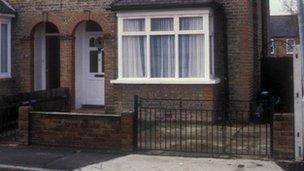Eric Pickles backs renting of driveways with guidelines
- Published

Renting out a single parking space should not require planning permission
People who rent out their driveways to other motorists are being backed by new government guidelines aimed at tackling parking congestion in busy areas.
The guidance for local authorities in England follows reports that some have threatened to levy fines if planning permission is not obtained.
Communities Secretary Eric Pickles suggested some councils may be worried about losing income from parking fees.
Motoring organisation the AA said the move would be "helpful" to motorists.
The guidelines come after Mr Pickles said lifting parking restrictions could boost local shops.
BBC political correspondent Robin Brant said the new guidelines were the latest announcement from the Department of Communities and Local Government (DCLG) in what appeared to be a concerted attack on town halls on behalf of motorists.
'Parking bullies'
The practice of renting parking spaces has become more prevalent in recent years helped by a number of websites which match households in and near town centres, train stations and sports grounds, to motorists.
Homeowners are advised to draw up a contract detailing liability with motorists using the parking space, consider safety aspects and bear in mind that any income will be subject to tax.
But according to the DCLG some residents have been told they will need to pay planning application fee costs of about £385 before renting out their driveway - or face a fine of up to £20,000.
In a statement, Mr Pickles described his announcement as a "clampdown on councils introducing a new backdoor parking tax on people's driveways and parking spaces".
The guidance - to be included in a current review seeking to consolidate planning practice - will make clear that homeowners should be able to rent a single parking space without planning permission "provided there is no public nuisance to neighbours, or other substantive concerns".
A distinction is made between renting out a space to park a single car and changing gardens into a car park or a clear commercial use like a car show room or minicab rank, which would require planning permission.
Mr Pickles said: "Councils should be welcoming common sense ways that help hard-working people park easier and cheaply and for families to make some spare cash.
"Councils shouldn't be interfering in an honest activity that causes no harm to others, unless there are serious concerns. Parking charges and fines are not a cash cow for town halls.
"This government is standing up against the town hall parking bullies and over-zealous parking enforcement."
'Common sense'
A spokesman from the Local Government Association said: "If homeowners want to do this it is right that their neighbours are consulted.
"Ultimately it is down to local areas to decide how they monitor this practice and in many places people do expect their council to ensure that their neighbours aren't doing things which increase traffic and change the character of their neighbourhood.
"People don't want to wake up one morning to find that their neighbour is operating a parking lot."
AA president Edmund King said the guidance was helpful.
"It is better to get cars off the road to keep traffic flowing. If driveways are empty during the day, it seems sensible to let their owners rent them out," he said.
"Local authorities make enough money out of parking and this may help to bring people back to the high street."
Alex Stephany, chief executive of parkatmyhouse.com, which matches drivers with householders looking to rent out driveways, said there was a "lack of clarity" about current rules and called Mr Pickles' plan a "common sense policy".
Earlier this week, Mr Pickles said motorists could be permitted to park free of charge on double yellow lines for up to 15 minutes under plans being considered to help boost High Streets.
Meanwhile, an RAC report which said parking charges provided huge cash surpluses for councils in some areas, prompted him to say a review of "unfair town hall parking rules" may be required.
Regulations say councils should not be pricing parking in order to make a profit.
- Published1 August 2013
- Published29 July 2013
- Published31 January 2013
- Published22 July 2013
- Published8 July 2013
- Published6 September 2012